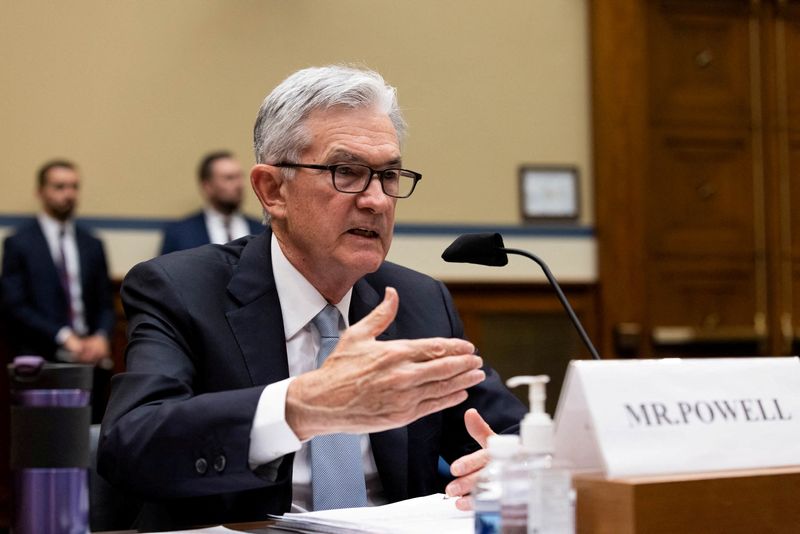By Saqib Iqbal Ahmed and Lewis Krauskopf
NEW YORK (Reuters) - Signs of falling U.S. inflation on Wednesday and growing hopes for interest rate cuts from the Federal Reserve could be a positive signal for large swathes of the stock market that have languished in a rally led by Big Tech.
Benign consumer price data fueled bets the Fed will lower rates in coming months and sent the S&P 500 to fresh highs. Stocks held onto gains after the Federal Reserve left interest rates unchanged and Fed Chairman Jerome Powell delivered an encouraging assessment of the economy.
Some investors believe expectations of cooling inflation andlooser monetary policy could boost areas of the market that have been hurt by higher rates, including shares of small caps and financial companies. That could ease worries about the risks of a market rally that has been concentrated in a cluster of giant tech stocks.
Though the S&P 500 is up about 14% this year, about 60% of the return has been driven by six companies whose shares have an outsized weighting in the index: Nvidia (NASDAQ:NVDA), Microsoft (NASDAQ:MSFT), Apple (NASDAQ:AAPL), Meta Platforms (NASDAQ:META), Alphabet (NASDAQ:GOOGL), and Amazon.com (NASDAQ:AMZN), data from S&P Dow Jones Indices showed.
If Wednesday's CPI report is the start of improved data that raises chances of rate cuts, "that can bring the whole yieldcurve lower, benefiting some of the areas that have beensensitive to the upside in yields," said Angelo Kourkafas, senior investment strategist at Edward Jones, including small caps and some economically sensitive stocks such as financials and industrials.
Short-term interest-rate futures are now pricing in morethan a 70% chance of a rate cut by September, up from only slightly better than a coin toss earlier in the day.
While technology and growth stocks have powered stock indexes higher in recent years, interest rate-sensitive areas ofthe market have often surged when hopes of easier monetary policy came to the fore.
One such episode came in the final months of last year, when small caps soared on expectations the Fed was done cutting rates. The small cap-focused Russell 2000 gained 13.6% in the final quarter of 2023, compared to an 11.2% gain for the S&P 500.
"The Fed doesn't even need to cut in July as we expect, it just needs to be heading towards that rate cut cycle, if youwill, and that should contribute to broadening performance,"Luke Tilley, Chief Economist at Wilmington Trust.
"Our view is not just that there is room for broadening, but that we fully expect that," he said.
Some broadening was in evidence on Wednesday. Though shares of market leaders such as Apple and Nvidia surged, the small-capfocused Russell 2000 was up around 2.2% against a 1.1% rise in the S&P 500. The small-cap index was down 0.1% for the year heading into Wednesday’s report.
Other areas bouncing back on Wednesday included the S&P 500 banks index, up 0.6%, although it remained in negative territory for the quarter. The Dow Jones Transportation Average was up 0.9% on the day, while the S&P 500 real estate sector gained 1.1%; both groups are still logging declines on the year.
The equal weight S&P 500 - a proxy for the average stock in the index - was up 0.7%. It has gained just 4.5% this year.

To be sure, investors were sticking with some of this year's winners too. Technology, the best performing S&P 500 sector this year, was up 2.9% on the day, including gains of more than 4% each for Nvidia and Apple.
At the same time, investors are likely to be cautious when it comes to cutting exposure to tech in favor of other areas of the market. The tech-heavy Nasdaq 100 has outperformed the Russell 2000 by about 24 percentage points over the last year. Looking back further, the performance gap is an even wider: 50% over two years and 53% over five yers, according to LSEG data.